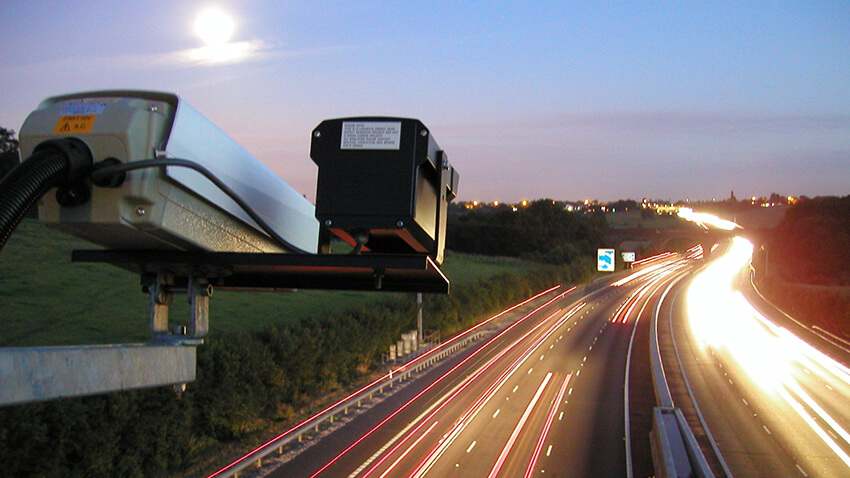If you're a driver then, whether you know it or not, you have probably seen ANPR cameras. What's more, your number plates have probably been recorded and checked by them.
We in the UK are reportedly amongst the most watched nations in the world when it comes to CCTV and traffic cameras. Estimates rank us in fourth place, behind the USA, China and Germany. A 2022 survey put the total number of private and official CCTV cameras at nearly 7.5 million. When it comes to surveillance of traffic, the estimated number of cameras is lower but still substantial - and growing.
What is ANPR?
As we have briefly explained before, ANPR, or automatic number plate recognition is, as you may well know, a system for reading, identifying and recording vehicle number plates. It was developed in the 1970s but many people still don't really know much about it. Basically, cameras record registration numbers from number plates and the system converts what the camera sees into data that can be stored and analysed. The information is usually sent to computer servers where it is checked against records of what the police call 'vehicles of interest'.
It's a bit of a broad term for a range of technologies of various ages and levels of sophistication. These days, ANPR cameras can record images digitally, recognise the characters shown in the images and transmit that extracted information remotely to the servers. Earlier versions, still widely used, take analogue images and provide video data rather than intelligently extracting the registration number information like the newer versions.
Even some general-purpose CCTV and other cameras can be used for ANPR. It all depends how the recorded video data can be processed. This makes it a little tricky to define exactly what is and what isn't an ANPR camera and makes it harder to get exact figures for the number of cameras. In 2021 it was estimated that there were around 11,000 ANPR cameras in the UK, sending more than 50 million 'read records' a day (now more than 60 million). Some of them are in fixed positions on roads while others are mobile units mounted in police vehicles.
What are the benefits?
The police consider ANPR an extremely valuable tool for both reducing and detecting crime. The system can spot, identify and locate uninsured vehicles, cloned number plates, cars used in crime, cars that evade emissions charges and tolls, cars that fail to obey traffic lights, cars that drive away from petrol stations without paying and much more. Some of the applications have a direct bearing on road safety so a strong case for their use can easily be made. Similarly, people and businesses who have been the victims of crime often appreciate the improved chances of catching the criminals and recovering property.
ANPR can also help with planning and managing traffic flow. Identifying vehicles makes it possible to establish journey times and other information that can inform decisions on things like traffic lights and roundabouts. It also makes it easier to provide the public with estimates of journey times and delays when there are problems on the roads.
What are the downsides?
The obvious objection, and the most common, is that of invasion of privacy. It is a fact that ANPR will record any number plate that passes its cameras, not just the ones used by crooks. It's just technology, it isn't psychic, so until it records images and checks the data it can't tell an innocent motorist from a criminal. Fortunately, like most other collection and use of private data, the information collected by ANPR is subject to rules and regulations.
Paradoxically, although ANPR can help detect cloned number plates, it can also be the reason some unfortunate drivers receive penalty charges for the offences committed by those who use cloned number plates! In order to tackle that particular problem it is important that motorists should inform the police and DVLA immediately if they suspect that someone may have copied their number plates.
A word of warning
We can understand why many people feel ambivalent about ANPR, and CCTV in general; however, even if you feel that your rights and privacy are threatened, you should be careful if you're tempted to try to dodge being watched.
It is illegal to mask, alter, cover or obscure your number plates to make them unreadable or to prevent them being recorded by cameras. That includes the use of non-permanent measures such as sprays or lights that are supposed to prevent your number showing on imaging equipment.
- Law-breaking drivers with examples of illegal number plates
- Number plates rules, regulations and specifications
In addition to the risk of penalties, you could also be wasting your money, as even the small number of products that work at all are only effective with certain types of cameras - usually older ones that are being phased out anyway.
Like it or not, surveillance cameras are a fairly unavoidable fact of life in 21st century Britain and many other places.
ANPR and your rights
The UK's data protection legislation limits the collection and use of data, including that gathered by ANPR.
The police store ANPR data for one year. Access to, and use of, that data is limited: staff usually only have access to it when it is directly necessary to their role, and then only for 90 days from the date of collection. The data is not sold on or shared with commercial organisations.
More information
How the police use ANPR data and the rules regarding that.
National ANPR Service: Rights of Data Subjects Notice (PDF, 283kb) - Your rights and the rules intended to safeguard you from misuse of ANPR data.
